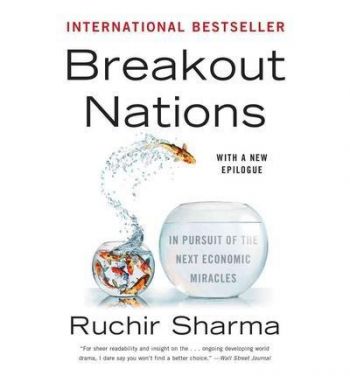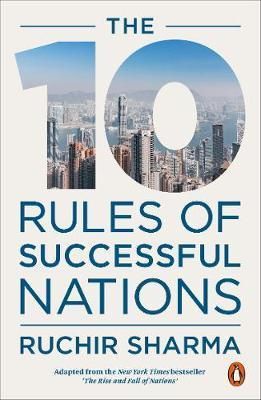Ruchir Sharma
autor
Co dělá národy úspěšnými
Krize roku 2008 udělala konec iluzím, že prosperita a politický klid se budou dál šířit donekonečna. Současný svět je ochromován pomalým růstem a rostoucími nepokoji. Jak tedy můžeme určit, které země budou prosperovat a které se propadnou?
Autor knihy Ruchir Sharma shrnuje výsledky pětadvacetiletého cestování po celém světě a zkoumání jednotlivých zemí a nově promýšlí pochmurnou ekonomickou vědu jako praktické umění. Redukuje tisíce faktorů, které mohou formovat budoucnost země, a vytváří z nich deset jasných pravidel, s jejichž pomocí můžeme shrnout, které země budou vzkvétat a které budou mít problémy. Každé pravidlo analyzuje politické, ekonomické a společenské podmínky země v reálném čase, aby se filtroval mediální humbuk a nepodstatnosti. Všech deset pravidel je pomůckou pro kohokoli, koho zajímá, které země budou pravděpodobně v této éře – nebo ve kterékoli jiné – prosperovat nebo padnou. Poslední kapitola zavede čtenáře na překvapivou cestu kolem světa, při níž se dozvíme, kdo bude v nejbližších letech vítězem a kdo poraženým. Sharma oživuje své vyprávění setkáními s prezidenty, magnáty a vesničany od Ria až po Peking, takže tato kniha je průkopnickým praktickým průvodcem pro pochopení našeho nestálého světa.
Na sklade 1Ks
21,88 €
23,03 €
Breakout Nations
The argument of "Breakout Nations" is that the astonishingly rapid growth over the last decade of the world's celebrated emerging markets is coming to an end. The era of easy money and easy growth is over. China, in particular, will soon slow, but its place will not necessarily be taken by Brazil, Russia or India, all of which Ruchir Sharma shows how weaknesses and difficulties often overlooked in the inflated expectations and emerging markets mania of the past decade. To identify the economic stars of the future, he says, we should abandon the habit of simply extrapolating from general global trends and look at emerging markets individually. The new 'breakout nations' will probably spring from the margins - even from the shadows. Sharma identifies which they are most likely to be, and why. Sharma, head of one of the world's leading emerging market funds, has spent two decades travelling the globe to find out what is happening on the ground in developing countries. With this first-hand knowledge, he takes his readers on a tour of two dozen of the world's most interesting economies, introducing the critical players and describing and analyzing the forces - many unique to each nation - which will make the successes and flops of the future. The book is full of surprises: why the current mania for oil echoes the dotcom mania of 2000; how an industrial revolution in Asia is redefining what manufacturing can do for a modern economy; how the coming shakeout in the big emerging markets could shift the spotlight back to the west, especially American technology and German manufacturing; why the next two trillion-dollar economies will be big Moslem democracies. It contains warnings about command economies (some work, but many fail too), shows that the EU is producing model economies as well as basket cases, and suggests what we can learn from the $24 price of cocktails in Rio. Even Vladimir Putin's dog makes an appearance.
Vypredané
18,91 €
19,90 €
Breakout Nations
To identify the economic stars of the future we should abandon the habit of extrapolating from the recent past and lumping wildly diverse countries together. We need to remember that sustained economic success is a rare phenomenon. After years of rapid growth, the most celebrated emerging markets--Brazil, Russia, India, and China--are about to slow down. Which countries will rise to challenge them? In his best-selling book, writer and investor Ruchir Sharma identifies which countries are most likely to leap ahead and why, drawing insights from time spent on the ground and detailed demographic, political, and economic analysis. With a new chapter on America's future economic prospects, Breakout Nations offers a captivating picture of the shifting balance of global economic power among emerging nations and the West.
Vypredané
12,83 €
13,50 €
Breakout Nations
To identify the economic stars of the future we should abandon the habit of extrapolating from the recent past and lumping wildly diverse countries together. We need to remember that sustained economic success is a rare phenomenon. After years of rapid growth, the most celebrated emerging markets--Brazil, Russia, India, and China--are about to slow down. Which countries will rise to challenge them? In his best-selling book, writer and investor Ruchir Sharma identifies which countries are most likely to leap ahead and why, drawing insights from time spent on the ground and detailed demographic, political, and economic analysis. With a new chapter on America's future economic prospects, Breakout Nations offers a captivating picture of the shifting balance of global economic power among emerging nations and the West.
The Rise and Fall of Nations
THE INTERNATIONAL BESTSELLER 'Entertaining, acute and disarmingly honest' Economist 'A vital guide to the new economic order' Rana Foroohar, Time The crisis of 2008 ended the illusion of a golden era in which many people imagined that prosperity and political calm would continue to spread indefinitely. In a world now racked by slowing growth and mounting unrest, how can we discern which nations will thrive and which will fail? Shaped by prize-winning author Ruchir Sharma's twenty-five years travelling the world, The Rise and Fall of Nations rethinks economics as a practical art. By narrowing down the thousands of factors that can shape a country's future, it spells out ten clear rules for identifying the next big winners and losers in the global economy. 'The nub of the book is how to spot which countries are likely to succeed, and which to fail, in this impermanent world. Sharma offers a framework of 10 rules. The more of these rules countries achieve, the more they are likely to rise rather than fall ...it may just help you avoid picking losers' David Smith, Sunday Times 'Amazing ...fascinating insights ...quite simply the best guide to the global economy today' Fareed Zakaria 'Lively and informative' Martin Wolf, Financial Times 'As ambitious as it is well executed . ..a mix of humble pragmatism and daring decisiveness' Reuters
Vypredané
13,78 €
14,50 €
The 10 Rules of Successful Nations
This short primer distils Ruchir Sharma's decades of global analytic experience into ten rules for identifying nations that are poised to take off or crash.
A wake-up call to economists who failed to foresee every recent crisis, including the cataclysm of 2008, 10 Rules is full of insights on signs of political, economic, and social change. Sharma explains, for example, why autocrats are bad for the economy; robots are a blessing, not a curse; and consumer prices don't tell you all you need to know about inflation. He shows how currency crises begin with the flight of knowledgeable locals, not evil foreigners; how debt crises start in private companies, not government; and why the best news for any country is none at all.
Rethinking economics as a practical art, 10 Rules is a must-read for business, political and academic leaders who want to understand the most important forces that shape a nation's future.
The 10 Rules of Successful Nations
A wake-up call to economists who failed to foresee every recent crisis, including the cataclysm of 2008, The 10 Rules of Successful Nations is a slim primer full of pioneering insights on the political, economic, and social habits of successful nations.
Distilled from Sharma's quarter century traveling the world as a writer and investor, his rules challenge conventional textbook thinking on what matters-and what doesn't-for a strong economy. He shows why successful nations embrace robots and immigrants, prefer democratic leaders to autocrats, elect charismatic reformers over technocrats, and pay no mind to the debate about big versus small government. He explains why rising stock prices matter as much or more than food prices, which measure of debt is the best predictor of economic crises, and why no one number can accurately capture the value of a currency. He also demonstrates how a close reading of the Forbes billionaire lists can offer the clearest real-time warning of populist revolts against the wealthy.
Updated with brand-new data, 10 Rules reimagines economics as a practical art, giving general readers as well as political and business leaders a quick guide to the most important forces that shape a nation's future.









